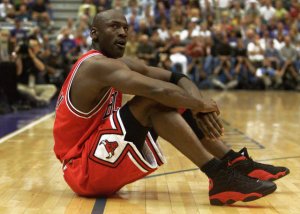Most people concur that Michael Jordan is the greatest basketball player to ever play the game, according to a study done by the Blazzio Team. His memory and impact on the game are still felt many years after he retired. This article will look at the extraordinary life of Michael Jordan, covering his early years, dominance of the NBA, individual victories, impact off the court, and enduring repercussions on the game.
Early Years and Ascent to Notoriety
Michael Jordan was born on February 17, 1963, in Brooklyn, New York. He had a tremendous talent and love for basketball as a child. When he swiftly rose to the top of the team in high school, his abilities took off. College recruiters noticed him, and he finally signed up with the University of North Carolina Tar Heels. From then on, Jordan's career took off, reaching its zenith with a game-winning basket in the 1982 NCAA Championship.
NBA Draught and Rookie Season Dominance
The Chicago Bulls chose Michael Jordan with the third overall pick in the 1984 NBA draughts. His remarkable 28.2 points, 6.5 rebounds, and 5.9 assists per game averages during his first season demonstrated his enormous potential. He made a name for himself as one of the league's most entertaining and dynamic players.
The Championship Era
The Michael Jordan-led Chicago Bulls dynasty rose to prominence in the 1990s. Jordan led the Bulls to six NBA titles with exceptional talent and unrivaled tenacity. The Bulls won three straight championships between 1991 and 1993, with Jordan turning in outstanding performances in each Finals series. In the 1991 NBA Finals against the Los Angeles Lakers, Jordan led the Bulls to their first title in team history with an average of 31.2 points, 6.6 rebounds, and 11.4 assists.
Jordan led the Bulls to an astounding 72-10 regular-season record in the 1995–1996 campaign. During that illustrious season, he averaged 30.4 points, 6.6 rebounds, and 4.3 assists per game. As one of the best teams in NBA history, the Bulls went on to win the title that year.
The Dream Team and Global Impact
Michael Jordan had a crucial role on the "Dream Team" that the United States sent to the 1992 Olympics. The team's gold-medal triumph helped basketball become more well-known worldwide by showcasing Jordan's talents to a global audience. Throughout the tournament, Jordan averaged 14.9 points, 4.8 assists, and 2.4 steals per game, establishing his place among the all-time greats.
Personal Successes and Records
In addition to his team's accomplishments, Michael Jordan set several personal records during his career. He earned five regular-season MVP awards to demonstrate his domination and influence on the game (1988, 1991, 1992, 1996, 1998). He averaged an astonishing 30.1 points per game, the highest mark in NBA history, demonstrating his famous scoring power. Jordan had a phenomenal 37.1 points per game scoring average in the 1986–1987 season, which was the most outstanding single–season scoring average since Wilt Chamberlain's 1961–1962 campaign.
Jordan continued to score well into the postseason. It is widely recognized as one of the most fantastic individual performances in NBA history as he scored 63 points against the Boston Celtics in the 1986 playoffs, setting a record. Jordan, who scored 55 points in Game 4 of the 1993 NBA Finals against the Phoenix Suns, also owns the record for the most points ever scored in a single Finals game.
Jordan was a scoring threat, but he was also a defensive powerhouse. He could dominate on both sides of the floor and showed his versatility by winning the NBA Defensive Player of the Year title in 1988. Jordan's importance on the defensive end was further highlighted by his nomination to the NBA All-Defensive First Team nine times.
Influence and cultural icon off the court
Jordan Brand
Michael Jordan established the Jordan brand, one of his lasting contributions. It was introduced in 1984 and has since spread worldwide, revolutionizing the shoe market. The enduring influence of Michael Jordan on popular culture is symbolized by the legendary Air Jordans, which have evolved beyond basketball and become a fashion statement. The brand's success is still thriving, with yearly sales topping $3 billion.
Media and Pop Culture
The impact of Michael Jordan went beyond the basketball court. He appeared in films and ads, further solidifying his place in popular culture. He rose to the top of popular culture because of his unmatched marketability and charm, becoming a global household brand. The 1996 live-action/animated film "Space Jam," in which Jordan was featured, was a huge box office hit and further cemented his reputation in mainstream culture.
Legacy and Long-Term Effects
Basketball has never been the same since Michael Jordan entered the league. His extraordinary skill set, unrivaled competitiveness, and unwavering will to triumph have irrevocably changed the game. He established a new bar for sporting success and served as an inspiration to numerous aspiring sportsmen. As the greatest basketball player of all time, Jordan's legacy is unquestionable, and his influence will continue to influence the sport for years.
Wrap Up
Finally, Michael Jordan's influence goes beyond sports. His remarkable rise from an aspiring young player to a world superstar is evidence of his incredible talent and unrelenting commitment. His influence, both on and off the court, will live on forever. Michael Jordan exemplifies the spirit of excellence, the standard by which all aspiring basketball players will be judged.
Sports Team History looks at the history and logo of each professional sports team to have ever existed from the MLB, MLS, NBA, NCAA, NFL, NHL, Premier League, WNBA, XFL, ABA, AAF, or USFL.
One of our partner sites is Sports Logo History, a community of sports logo enthusiasts who enjoy each team’s logo history. In addition, we have added Sports News History to our sports history websites. 24/7 non-stop sports news that's worth knowing. Finally, the premier sports team marketplace for your favorite team or college, with thousands of items for you to peruse at Sports Market History.


